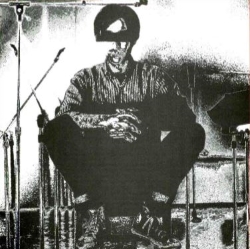
The Role Of Small Studios
“Small studios, whether analog or digital, will contribute new musical ideas. The flexibility to develop these ideas cannot be fostered by big industry. They have to sell too much lowest common denominator to fuel the machine. They are going to stick with knowns. Madonna will come out, and everyone will pull out their Madonna clones. Chop a piece of the known pie, so they can get a given amount of percentage of a known total. Heaven forbid they have to bake a new pie.
“Where were they when Windham Hill was going it alone? Sitting back, laughing, saying it would never take off. And when New Age became a multi-million dollar industry in its own right? Then it was ‘Oh sh**, we better cover this! Let’s start a label and call it Crystals and Light and get some young Marin synthesist to do string swells for 45 minutes: “The new things come to light in small studios, driven by small budgets and distributed by small labels. Driven by the desire of creative people to pursue their musical ideas.
Quality Of The End Product
“When people listen to my albums, they don’t say, `Gee, that sounds very good for being produced in a cheap little room.” If you have the basic gear, and you know how to use it, you can make it sound as good as any music anywhere.
“Bear in mind that a big chunk of what all that is about, of course, is the music itself. That’s what the people are listening to. Expensive effects and 20-bit spatial ambiance are nice, but people don’t buy albums to hear that. It’s the music. OK, my 5534 and TLO 72 op-amped board will not give the crystalline dimension that a Trident A series or, even better, a classic discrete Neve will. And my analog 16-track isn’t going to put out what a Studer or Sony digital will.
“But what my clients are buying is primarily the ideas, ideas that have been organized and put together artistically well. Musicians who come in and work with me are every bit as good as the guys who work in the big studios. But they can’t afford to work there. I couldn’t afford to take them in there any more as a producer. They wouldn’t have a chance – not enough time or budget to get their ideas across.
“Now, a higher studio rate certainly buys intangibles and behind-the-scenes stuff: phone lines and secretaries, decor and how heavy the service duty cycle is on the tape deck’s servo capstan motor. But the average listener doesn’t care about the lobby furniture or listen closely to how smooth the top end of the cymbals are. They’re listening to the songs. If those songs can’t even get delivered to them, in any form – if the artist can’t afford to record – then they don’t even get to hear it. That, I think, robs the industry.
The Neighbors
“My neighbors are no problem. We maintain a very low profile. We have a driveway that comes down the side of the house, so that when people come in, they park there and unload, and they’re in a recording studio. The whole time they’re here, except when they step out for a cigarette or something, it’s quiet. The studio is soundproof, of course. People can’t hear us, we can’t hear them. The street has traffic, so we don’t impact the neighborhood.
“Most folks probably don’t have a clue what’s going on here. What would they say if they knew? I don’t think they’d care. No more than the corner grocery up the block, or the palm reader or hair stylist a block away. It doesn’t impinge on their lifestyle. My business can be operated without undue attention.
Guerrilla Tactics
“We take every advantage we can to keep costs down. Is some of that illegal? Maybe. That’s why you’re referring to me as Mr. X. I am using guerrilla tactics to move ahead in an industry that is not very encouraging to independent creative guys like me. Yet the industry would have to admit that it benefits from us at the same time. I develop the music and artists and techniques for presentation to folks at the higher, commercial level, at which point they take it, make huge profits, and grind it up as so much fodder.
“Did rap and house music start in Capital or Warner Bros. studios? No way! Are they making money off of it now, after it’s been fully developed by people like me, who barely made a dime off it, after the hard work was done? Damn straight! The industry’s a machine, and I’m just another guy on the front line who finds and processes the fuel it runs on. Fortunately, I get off on doing that. A guy can come into our studio and start generating the stuff that makes him attractive to the next layer up.
“Most of the studio owner bitchers and moaners don’t realize that we are a feeder system, the farm league, for their future income. We are developing the people who hopefully, if their product sells on some level and they get proficient at producing audio, will gather a larger following until somebody recognizes them and injects a budget to allow them the luxury of working in a fancier environment, a more technically equipped facility, like one of the moaner’s rooms, under the watchful multi-million dollar eye of A &R. One can only hope the art won’t get sucked out.

